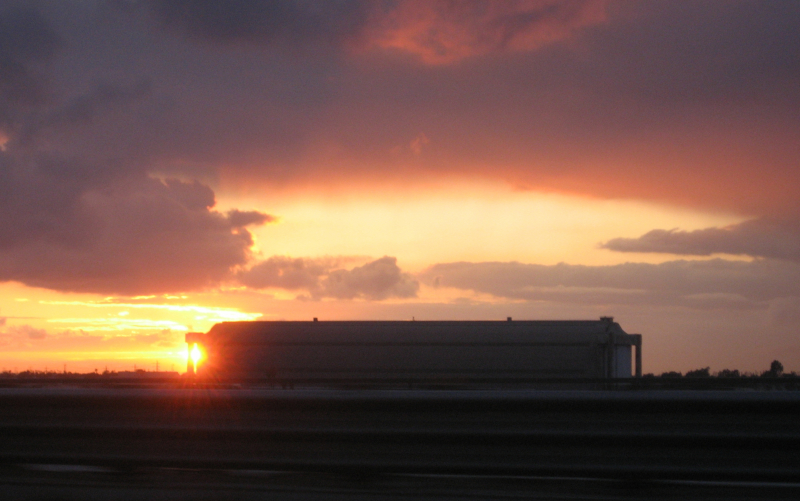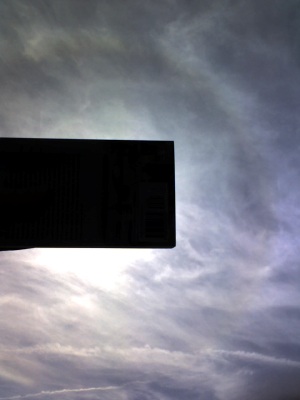 Whenever there’s a light layer of cirrus clouds in the sky, I keep an eye out for halos. I catch the occasional iridescent cloud, or a faint sundog that’s only visible through sunglasses. Today I spotted a 22° halo as I walked back to my car after lunch, around 2:00pm on March 6.
Whenever there’s a light layer of cirrus clouds in the sky, I keep an eye out for halos. I catch the occasional iridescent cloud, or a faint sundog that’s only visible through sunglasses. Today I spotted a 22° halo as I walked back to my car after lunch, around 2:00pm on March 6.
It’s not as sharp as the one I caught 2 years ago, but there was more color. It was clearly reddish toward the inside and bluish toward the outside. Like last time, I didn’t have the good camera, just my cell phone, but at least this time it was a better phone!
This reminds me, our trip to San Francisco a few weeks ago was through patchy clouds, sun, and rain—perfect for rainbows. We spotted several, including one which was not only extremely bright, but actually showed supernumaries inside the band.
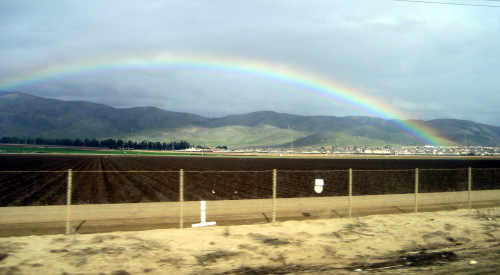
We saw this on Thursday, February 21, somewhere between Paso Robles and San Jose along US Highway 101. Katie remarked that it looked almost double-layered, I looked over, and said, “Grab the camera! It has fringes!”
I’d never seen, or never noticed supernumaries before. I’d never even heard of them until I was reading through Atmospheric Optics a few years ago. If you look on this color-enhanced picture (actually from another photo of the same rainbow), you can see several extra bands inside the violet arc, alternating green and pink.
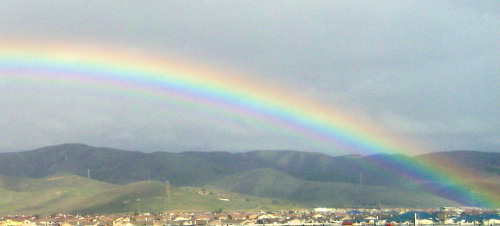
The really weird thing? Classical optics doesn’t explain them. Refraction and reflection can only explain the red-to-violet band and the secondary bands that sometimes appear outside the main arc. These are actually wave interference patterns that occur if the water droplets are small enough.
On a related note, last Sunday (March 2) I saw what I’m fairly certain was a lenticular cloud, except it didn’t look remotely like a lens. It was just a long, narrow flat cloud floating above the Santa Ana Mountains. I noticed it around 3:00 in the afternoon, and a couple of very thin, also flat clouds above it, and thought it looked like the beginnings of the stack formation. What clinched it was the fact that the cloud was still there, 5 hours later (visible at night by reflected city light), despite the high Santa Ana winds. You know, after spotting two sets last summer, it looks like they form in Orange County a lot more often than I thought.
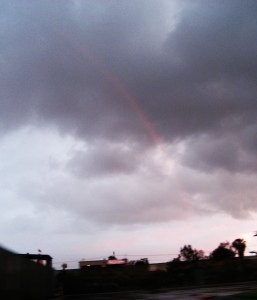 At sunset, there were clouds above us, rain in the east, and clear skies to the west, showing a bright orange sun. We looked to the east, and saw a huge rainbow. It was extremely high—it looked like it ought to be an entire circle, even though I knew it couldn’t be more than a semicircle. That doesn’t come through in the one photo that came out, since it’s a matter of perception: neither of us had ever seen a rainbow centered at the horizon before. It was also faint (I had to increase the contrast on this photo), and
At sunset, there were clouds above us, rain in the east, and clear skies to the west, showing a bright orange sun. We looked to the east, and saw a huge rainbow. It was extremely high—it looked like it ought to be an entire circle, even though I knew it couldn’t be more than a semicircle. That doesn’t come through in the one photo that came out, since it’s a matter of perception: neither of us had ever seen a rainbow centered at the horizon before. It was also faint (I had to increase the contrast on this photo), and 